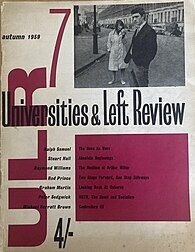 | |
| Founded | 1957 |
|---|---|
| Final issue Number | Autumn 1959 7 |
Universities and Left Review was a socialist magazine that published seven issues between 1957 and 1959.
 | |
| Founded | 1957 |
|---|---|
| Final issue Number | Autumn 1959 7 |
Universities and Left Review was a socialist magazine that published seven issues between 1957 and 1959.
Universities and Left Review was founded in 1957 by Oxford students Raphael Samuel, Gabriel Pearson, Charles Taylor, and Stuart Hall. [1] [2]
The initial impetus behind the magazine came from the events of 1956, particularly the Suez crisis, the Soviet invasion of Hungary and Khrushchev's revelations about the Stalin's purges, that triggered shockwaves throughout the British left. As Hall was later to write, these events were "as significant to us as 1968 was to become to a later generation." [3]
The magazine's first issue was produced in spring of 1957, and contained essays by three of the founding editors, Pearson, Hall and Taylor, as well as contributions from the artist Peter de Francia, Lindsay Anderson the noted British New Wave filmmaker, the economist Joan Robinson, historians E.P. Thompson, Eric Hobsbawm and Isaac Deutscher, and the town planner Graeme Shankland. Later issues would include essays by Samuel, Raymond Williams, Richard Hoggart, Isaac Deutscher, John Strachey, Peter Sedgwick, Ralph Miliband, Karel Reisz, Margot Jefferys, John Berger and others, and feature design by future design director of Penguin Books, Germano Facetti. [4] The photographer Roger Mayne contributed images for the covers of issues 4,5,6,and 7.
The magazine was self-consciously inspired by Left Review , the literary and cultural magazine of the Communist Party of Great Britain that developed a sophisticated modernist cultural politics in the 1930s. It was equally inspired by the socialist humanist magazine The New Reasoner , founded by E.P. Thompson in 1956, whose aim was to espouse a form of Marxist humanism against Communist Party orthodoxy. ULR would, however, be marked from its predecessors by its openness to debate, as well the influence of the burgeoning youth culture of late 1950s Britain. [5] Notable was the debate on "classlessness," inaugurated by Hall's essay "A Sense of Classlessness" from ULR 5, that sparked responses from both Samuel and E.P. Thompson in later issues. [6]
In late 1959, ULR merged with fellow socialist magazine New Reasoner to produce the New Left Review.

Raymond Henry Williams was a Welsh socialist writer, academic, novelist and critic influential within the New Left and in wider culture. His writings on politics, culture, the media and literature contributed to the Marxist critique of culture and the arts. Some 750,000 copies of his books were sold in UK editions alone, and there are many translations available. His work laid foundations for the field of cultural studies and cultural materialism.
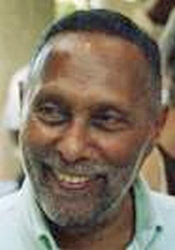
Stuart Henry McPhail Hall was a Jamaican-born British Marxist sociologist, cultural theorist, and political activist. Hall — along with Richard Hoggart and Raymond Williams — was one of the founding figures of the school of thought known as British Cultural Studies or the Birmingham School of Cultural Studies.
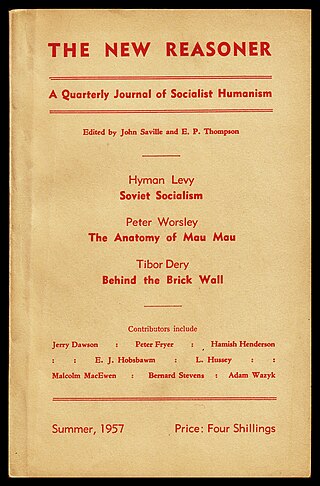
The New Reasoner was a British journal of dissident Communism published from 1957 to 1959 by John Saville and E. P. Thompson. The publication is best remembered as an antecedent of the long-running journal New Left Review.

The New Left Review is a British bimonthly journal covering world politics, economy, and culture, which was established in 1960.

Francis Rory Peregrine "Perry" Anderson is a British intellectual, political philosopher, historian and essayist. His work ranges across historical sociology, intellectual history, and cultural analysis. What unites Anderson's work is a preoccupation with Western Marxism.
Raphael Elkan Samuel was a British Marxist historian, described by Stuart Hall as "one of the most outstanding, original intellectuals of his generation". He was professor of history at the University of East London at the time of his death and also taught at Ruskin College from 1962 until his death.
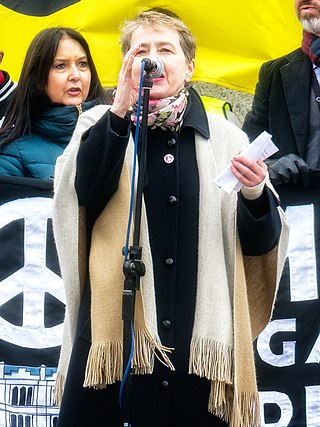
Katharine Jane Hudson is a British left-wing political activist and academic who is the General Secretary of the Campaign for Nuclear Disarmament (CND) and former Media Officer of Left Unity. She served as Chair of CND from 2003 to 2010 and has been an officer of the Stop the War Coalition since 2002.

Lawrence Grossberg is an American scholar of cultural studies and popular culture whose work focuses primarily on popular music and the politics of youth in the United States. He is widely known for his research in the philosophy of communication and culture. Though his scholarship focused significantly throughout the 1980s and early 1990s on the politics of postmodernism, his more recent work explores the possibilities and limitations of alternative and emergent formations of modernity.

John Saville was a Greek-British Marxist historian, long associated with University of Hull. He was an influential writer on British labour history in the second half of the twentieth century, and also known for his multi-volume work, the Dictionary of Labour Biography, edited in collaboration with others.

Angela McRobbie is a British cultural theorist, feminist, and commentator whose work combines the study of popular culture, contemporary media practices and feminism through conceptions of a third-person reflexive gaze. She is a professor of communications at Goldsmiths College, University of London.

Alan Finlayson is a British political theorist and political scientist. He is Professor of Political and Social Theory at The University of East Anglia in the United Kingdom, having previously taught in the Department of Political and Cultural Studies at Swansea University, and the Department of Politics and International Relations at Queen's University Belfast. He is a leading advocate of rhetorical political analysis and of its importance for the study of British politics.
Alison Light, is a writer, critic and independent scholar. She is the author of five books to date. In 2020 A Radical Romance, was awarded the Pen Ackerley prize, the only prize for memoir in the UK. Common People: The History of an English Family (2014) was shortlisted for the Samuel Johnson prize. She has held a number of academic posts and is currently an Honorary Fellow in History and English at Pembroke College, Oxford. She is also an Honorary Professor in the Department of English, University College, London and an Honorary Professorial Fellow in the Department of English, Edinburgh University. She is a founding member of the Raphael Samuel Archive and History Centre in London.
The Partisan Coffee House was a radical venue of the New Left, at 7 Carlisle Street in the Soho district of London. It was established by historian Raphael Samuel in 1958 in the aftermath of the Suez Crisis and the Soviet invasion of Hungary. It closed in 1962, victim of a "business model" that was hospitable to the penniless intellectuals who patronised it, but wholly unrealistic. The building is now utilised as office space.
Cultural studies is a politically engaged postdisciplinary academic field that explores the dynamics of especially contemporary culture and its social and historical foundations. Cultural studies researchers generally investigate how cultural practices relate to wider systems of power associated with, or operating through, social phenomena. These include ideology, class structures, national formations, ethnicity, sexual orientation, gender, and generation. Employing cultural analysis, cultural studies views cultures not as fixed, bounded, stable, and discrete entities, but rather as constantly interacting and changing sets of practices and processes. The field of cultural studies encompasses a range of theoretical and methodological perspectives and practices. Although distinct from the discipline of cultural anthropology and the interdisciplinary field of ethnic studies, cultural studies draws upon and has contributed to each of these fields.
Marxism Today, published between 1957 and 1991, was the theoretical magazine of the Communist Party of Great Britain. The magazine was headquartered in London. It was particularly important during the 1980s under the editorship of Martin Jacques. Through Marxism Today, Jacques is sometimes credited with coining the term "Thatcherism", and believed they were deconstructing the ideology of the government of the-then Prime Minister of the United Kingdom, Margaret Thatcher, through their theory of New Times. It was also a venue for the influential British cultural studies of Stuart Hall.
The Spirit of Revolt Archive, based in Glasgow (Scotland), is dedicated to collecting, managing and preserving multi-media records from Glasgow’s and Clydeside’s anarchist and libertarian-socialist movement. It is a ‘community archive’, largely run by volunteers. It was constituted in August 2011 and today forms part of Glasgow City Archives’ collection whilst maintaining its organisational independence. Its catalogue will join the National Records of Scotland in 2013. The archive derives its name from the title of an 1880 pamphlet by the Russian anarchist Peter Kropotkin. The archive’s digitised documents are hosted on www.archive.org.
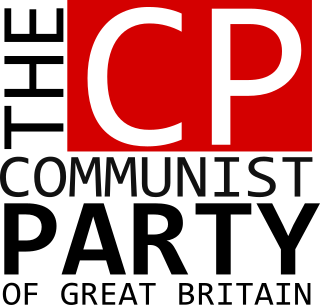
The Communist Party of Great Britain (CPGB) was the largest communist organisation in Britain and was founded in 1920 through a merger of several smaller Marxist groups. Many miners joined the CPGB in the 1926 general strike. In 1930, the CPGB founded the Daily Worker. In 1936, members of the party were present at the Battle of Cable Street, helping organise resistance against the British Union of Fascists. In the Spanish Civil War, the CPGB worked with the USSR to create the British Battalion of the International Brigades, which party activist Bill Alexander commanded.
Post-Marxism is a perspective in critical social theory which radically reinterprets Marxism, countering its association with economism, historical determinism, anti-humanism, and class reductionism, whilst remaining committed to the construction of socialism. Most notably, Post-Marxists are anti-essentialist, rejecting the primacy of class struggle, and instead focus on building radical democracy. Post-Marxism can be considered a synthesis of post-structuralist frameworks and neo-Marxist analysis, in response to the decline of the New Left after the protests of 1968. In a broader sense, post-Marxism can refer to Marxists or Marxian-adjacent theories which break with the old worker's movements and socialist states entirely, in a similar sense to post-Leftism, and accept that the era of mass revolution premised on the Fordist worker is potentially over.
The New Left was a broad political movement that emerged from the counterculture of the 1960s and continued through the 1970s. It consisted of activists in the Western world who, in reaction to the era's liberal establishment, campaigned for freer lifestyles on a broad range of social issues such as feminism, gay rights, drug policy reforms, and gender relations. The New Left differs from the traditional left in that it tended to acknowledge the struggle for various forms of social justice, whereas previous movements prioritized explicitly economic goals. However, many have used the term "New Left" to describe an evolution, continuation, and revitalization of traditional leftist goals.
Notes from Below is a UK-based digital magazine, founded in 2018, that publishes "workers' inquiries" and contemporary class analyses. The editors, including Jamie Woodcock and Callum Cant, have modeled their work after the Italian journal Quaderni Rossi and early surveys about working conditions conducted by Karl Marx. Through the inquiries it publishes, the magazine promotes class consciousness and workerism. The inquiries featured in the magazine have included workers at call centers, Amazon delivery centers, universities, tech companies, and pubs and its coverage has focused on small, militant unions like the Independent Workers' Union of Great Britain.